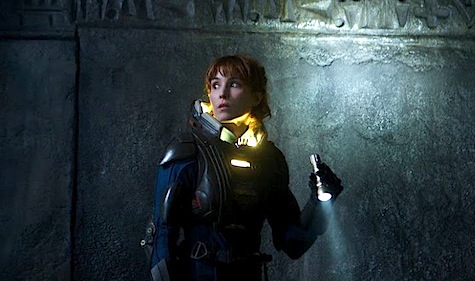Dr. Elizabeth Shaw, the hero of the new epic Prometheus wears a crucifix and believes in a higher power. She’s a great, likable character who I enjoyed seeing wield an ax. But she didn’t feel like a scientist to me, at least not in a science fictional kind of way. To say that the search for a higher power occupies the majority of the Prometheus’s narrative is no spoiler, as the promotional tagline for the film is “the search for our beginning could lead to our end.” And in that search for our beginning, Prometheus pulls a few revelatory punches, and in doing so makes aspects of film’s thematic noise feel, at least on the surface, to be more religious fiction than science fiction.
Tons of spoilers for Prometheus below.
Now, screenwriter Damon Lindelof has recently gone on record saying Prometheus is not anti-science, and I found all of his reasons to be mostly valid. I also liked the film he co-wrote very much, and wouldn’t be getting into all of this if I didn’t enjoy the hell out of it. However, I think this is a situation where the intent of the screenwriter and director ended up not totally coming through in the final film or at the very least, didn’t fit the genre people thought it was in.
Science fiction, and science fiction films in particularly tend to be lousy with protagonists who are scientists. This seems obvious, natural and good, but when you consider the challenges of a fairly straightforward, big mainstream sci-fi film, having characters who are scientists might be problematic. That is, from the perspective of the screenwriter—who is likely not a scientist—writing about realistic scientists would probably make said screenwriter very nervous.
For one thing, my feeling is a lot of audience members might not be able relate to scientist characters, particularly ones who come from a future time and know about science that hasn’t been invented. Further, scientists are perceived as inherently geeky; meaning aspects of conventionally “heroic” qualities can sometimes get bogged down or confused in the technicalities. Ideally, this wouldn’t matter to most people, and in prose science fiction, it frequently doesn’t. (It also worked just fine in Contact.)
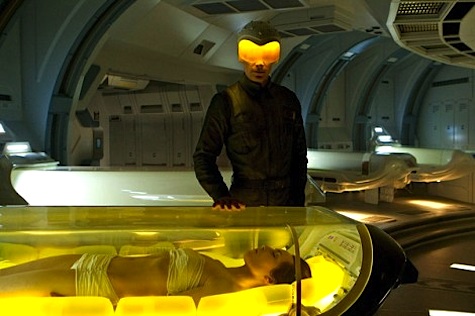
But films are a different animal, all full of aesthetics and sensory emotional manipulation, which work completely different than prose. Also, whether it’s right or wrong, certain kinds of movies cultivate audiences who expect certain things from their protagonists, and reliability to the main characters is fairly integral for the movie to work. So, I would venture to guess many big-budget, hot-shot screenwriters (like Damon Lindelof) would be loathe to have astronauts or scientists do dull science stuff like research and paperwork.
To put it another way: if you’re writing a movie about James Joyce, you can’t have tons of scenes with Joyce just sitting in a room, alone, writing silently. Sure, it would realistically depict what it’s like to be a writer, but no one would sit for it. So, if you’ve got scientist characters, you’ve got to render them larger-than-life but somehow retain their scientific cred. You’ve got to show the scientific process as an active, exciting thing. This is probably very hard to do, particularly if you’re going to fictionalize the science.
But, in Prometheus we get not one, but two scientists who don’t even vaguely feel like real scientists. Shaw and her husband Charlie come across more as hobbyist UFO watchers than people who actually engage in scientific pursuits for a living. When they discover curiously similar pictograms all over the world, they conclude (somehow) that this means the origins of human life come from another planet, and those alien creators have “invited” us to come hang out with them. When a skeptical character wonders aloud if they can back up this stuff, they just sort of look at the guy like “I know you are but what am I?” We’re not offered a clear reason as to why Charlie and Elizabeth think this is true.
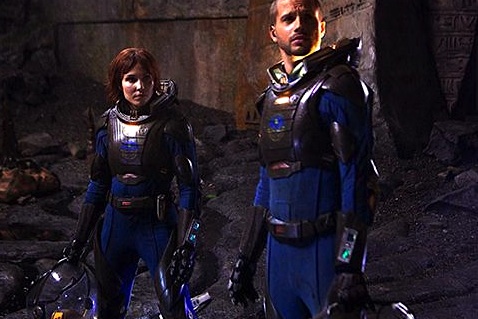
Instead, it’s heavily implied that it has to do with Shaw’s religious inclinations, which lead her to want to, in essence, talk to God. This faith seems to come from the fact that her father died when she was young, which is okay, but it’s as though the screenwriters decided you can’t possibly have a scientist who believes in religion without giving them a tragedy to explain their faith away. Isn’t this a bit insulting to both scientists and people of faith?
Also, it seems to me that the movie is about determining the shape of God, not determing if God exists or not. Doesn’t Prometheus already conflate the two ideas from the outset? I feel like Natalie Portman quoting Arthur C. Clarke in Thor more elegantly weaves the God/science thing into its narrative than anything in this film. In Prometheus, instead of trying to make scientists into interesting, dynamic people, they’re just portrayed as religious, non-science people. And here’s where I start wondering if this is truly science fiction, or instead, religious fiction.
If it’s science fiction, then the theme of Prometheus shouldn’t be faith versus science. Instead, it should be about coming up with a scientific explanation for God. And, the movie in a way, tries to do that. But it sends a mixed message by having these characters act like such bad scientists. It’s as though the screenwriters couldn’t decide where to fall on explaining any of the cool science fiction stuff, so they just decided to explain almost none of it. Part of not giving us answers migtht be because in real life, there aren’t answers to everything either. And I totally get the motivation to write the movie like that because in a sense, it seems more honest. But, it’s still a fairly unsatisfying narrative choice, particularly in a movie which raises so many specific questions.
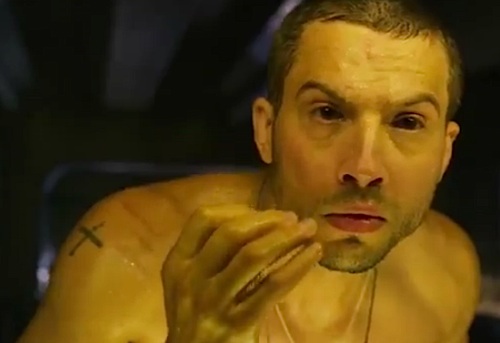
When they gang discovers that the Engineers appear to be dead, Charlie freaks out and goes on an overnight drunk, because he “really wanted to talk to them.” Never mind that these people have just made the biggest discovery in the history of everything (human life came from outer space)—but because he can’t talk to them, he’s pissed. Both Charlie and Shaw are searching for “answers,” seemingly at any cost, behaving almost like religious zealots.
Should we listen to the captain of the spaceship? Hell no. Stick some crazy needle in this decapitated head without really knowing what we’re doing? Sure. Take off our helmets on an alien planet because it seems like the air is breathable? Why not. Do these people seem like scientists to you?
Further, though Shaw ends the film by continuing to search for answers, no one, not even the super intelligent robot David tries to put two and two together about what the hell is even happening on the planet in the here and now. In fact, the only character who actually SAYS OUT LOUD WHAT IS HAPPENING is not a scientist! When Captain Janek tells Shaw that the planet is a weapons depot and all these creepy organisms were manufactured to be weapons of mass destruction, it makes a lot of sense. How did he figure this out? Well, he gathered some evidence, he observed, and he asserted a hypothesis. He doesn’t really need to test the hypothesis here too much, because he’s not concerned with being right.
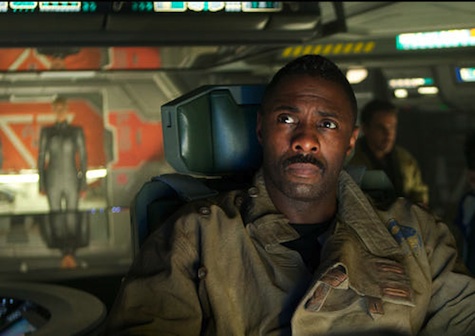
The threat that his idea could be correct is enough to freak out about. It’s way better than Shaw just shouting “we were so wrong!” Wrong about what? You thought beings from another world made humans. You were right about that. Boom. Scientific fact, the DNA matched. Good job! But then Shaw and David find out the Engineers wanted to destroy humanity, and she wants to know why.
Well, there are some possible answers, just none that are given in the movie itself. I’m just a guy who watches a lot of science fiction movies and reads novels. I’m no rocket scientist, just like Captain Janek is just a good guy who flies a spaceship, but I can give it a go for you, Dr. Shaw. Here goes:
The Engineers made humans as a necessary host for the proto-chest bursting Aliens. Maybe the humans are one half of the weapon, and the creepy squid things are the other half. That seems like a reasonable explanation, right? I mean, I have the same information these characters do, and that makes sense to me. We’re one half of a weapon, like a fail-safe. The Engineers got freaked out about this and decided to destroy both parts, but failed. Explaining this wouldn’t ruin a thing. It would make cool stuff already in the movie much cooler. Also, thematically, the fact that these terrible Aliens have to come from inside of us could also be a cool metaphor about sin or whatever. See, they could get their religious themes in there and explain stuff at the same time.
(Note: as far as I know, this notion of humans being one part of a weapon is just my theory and the first thing that entered my mind when I left the theater. All the Q&As with the filmmakers seem to give different answers.)
But my theory is just as good as any other, because the film itself never gets specific. It never actually answers its own questions in a concrete way. Instead, Shaw make assertions about how “there are no answers,” while inhabiting a film that is about a search for answers. I suppose this is part of the “point” of the film, but paradoxically, though we’re told there are no answers, the film casually gives us visual evidence that seems to supply us with possible answers. This seems to me not dissimilar from a certain brand of fundamentalist creationist randomly that claims the Earth is, like, 5 minutes old, despite all the evidence to the contrary.
Shaw is given a little material to work with, but refuses to form any theories, because, from what we can see, she’s not a good scientist. If there were a bunch of scientists in this movie, you can imagine a scene in which they throw out theories as what is going on. That could actually be cool, and not make the movie any less weighty or philosphical. But it would certainly change the tone.
Shaw is a good person, and pretty heroic, and occupies a fun, beautiful, scary movie. But in the reality of the movie, her half-assed research combined with faith approach is responsible for getting all of these people killed, by bringing them to the planet in the first place.
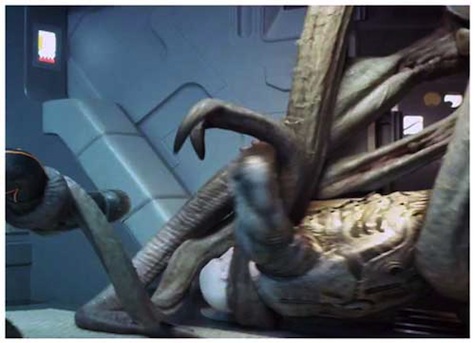
Is this the point of the movie? Quack scientists will lead us to our doom? Or more disturbingly, that if we search for answers about the very nature of existence, we will be destroyed by creepy creatures. This, in the end seems like a message that science is scary, rather than an awesome investigative tool. Which in a science fiction movie, sort of makes you bummed out. To make matter worse, director Ridley Scott has recently said that the Engineers were going to destroy us because humanity killed Jesus (who was an Engineer.) Personally, I find this overly simplistic explanation to be trite. It’s as though Ridley Scott’s movie is smarter than he is, if just barely. Or, again, maybe this movie is religious fiction and not science fiction.
Prometheus is by no means a bad film, and the fact that there is so much to talk about is totally to its credit. If it is indeed a science fiction movie, then I can’t shake the feeling that it either needed to jettison the idea of having scientist characters altogether (as the previous Alien films largely do) or make Charlie and Elizabeth show us the some movie-version of the research.
Because this is a big movie, and I’m just a dumb moviegoer, I want someone to root for. And if the film is not a comedy, and certainly a science fiction movie, then I should not be rooting for crackpot scientists with research that seems at least on par with (pun intended) Ripley’s Believe It or Not!
But if it’s as I suspect, actually religious fiction, then I suppose I’ll root for Shaw for what she is: a Pilgrim in an unholy land.
Ryan Britt is the staff writer for Tor.com.










